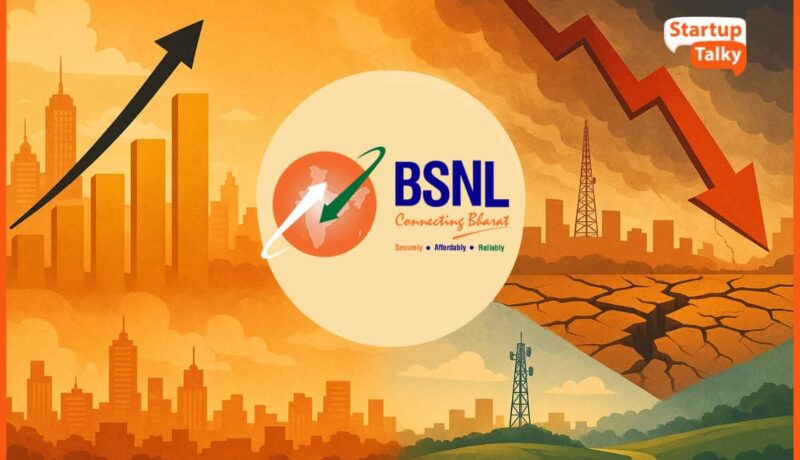
BSNL’s Turnaround: Profit, 5G Success, and VI Merger Buzz
Bharat Sanchar Nigam Limited (BSNL), once synonymous with bureaucratic inefficiency and mounting losses, is showing signs of a remarkable turnaround. After years of struggling to stay afloat in a fiercely competitive telecom market dominated by private players, the state-run telco has reported profits, initiated its 5G rollout, and is even being discussed as a potential player in the ongoing Vodafone Idea (VI) crisis. This unexpected resurgence has sparked renewed hope for the company’s future, prompting questions about its long-term sustainability and its ability to truly compete in the rapidly evolving telecom landscape.
Table Of Content
- BSNL: From Red to Black? Profitability Finally Achieved
- 5G Rollout: Can BSNL Compete with Private Telecoms?
- Revival Plan Bears Fruit: BSNL’s Unexpected Comeback
- Vodafone Idea Merger: Is BSNL Part of the Solution?
- Debt Reduction: BSNL’s Financial Health Improves Steadily
- Employee Morale Soars: Hope Returns to State-Run Telco
- Government Support Key: BSNL’s Future Hangs in Balance
- Challenges Remain: Can BSNL Sustain This Positive Trend?
BSNL: From Red to Black? Profitability Finally Achieved
BSNL’s journey from chronic losses to profitability is a significant milestone. Years of financial woes, exacerbated by delayed 4G rollout and intense competition, had pushed the company to the brink. However, recent reports indicate a positive shift, with BSNL posting profits, albeit modest, in select quarters. This achievement is attributed to a combination of factors, including government support, cost-cutting measures, and increased revenue from its enterprise business.
While the profit margins remain slim, the move into the black signifies a crucial turning point for BSNL. It suggests that the implemented restructuring and revival packages are beginning to yield results. The ability to generate revenue and manage expenses effectively is essential for BSNL to regain its footing and invest in future growth. Whether this profitability can be sustained in the long run remains to be seen, but it offers a much-needed morale boost and a foundation for future success.
5G Rollout: Can BSNL Compete with Private Telecoms?
BSNL’s 5G rollout is a critical step in its efforts to remain relevant in the age of high-speed internet. After years of being behind the curve in terms of technology, the company is finally deploying 5G networks across the country. This rollout, however, faces significant challenges, including limited funding, infrastructure constraints, and the need to compete with established private players who already have a substantial head start.
The success of BSNL’s 5G rollout will depend on its ability to offer competitive pricing, provide reliable coverage, and innovate with new services. While the company may not be able to match the scale and speed of private telecoms initially, it can focus on niche markets and underserved areas to gain a foothold in the 5G space. The government’s support in providing access to spectrum and infrastructure will also be crucial for BSNL to effectively compete and bridge the digital divide.
Revival Plan Bears Fruit: BSNL’s Unexpected Comeback
The government’s comprehensive revival plan for BSNL is proving to be instrumental in the company’s unexpected comeback. This plan includes financial assistance, debt restructuring, voluntary retirement schemes (VRS) to reduce employee costs, and the allocation of 4G and 5G spectrum. These measures have provided BSNL with a much-needed lifeline, allowing it to modernize its infrastructure and compete more effectively.
The VRS scheme, in particular, has significantly reduced BSNL’s employee burden, leading to substantial cost savings. The allocation of spectrum has enabled the company to launch its 4G and 5G services, attracting new customers and generating revenue. While the revival plan is still ongoing, its initial success demonstrates the potential for government intervention to revitalize struggling public sector enterprises.
Vodafone Idea Merger: Is BSNL Part of the Solution?
The precarious financial situation of Vodafone Idea (VI) has sparked discussions about potential mergers and acquisitions, with BSNL’s name emerging as a potential solution. The idea of merging BSNL with VI has been floated as a way to consolidate the telecom sector, strengthen competition, and provide a lifeline to the struggling private player. However, such a merger would present significant challenges, including integrating disparate networks, managing overlapping infrastructure, and addressing the cultural differences between a state-run and a private company.
While a merger between BSNL and VI could create a stronger entity with a larger market share, it is not without its risks. The government would need to carefully consider the potential benefits and drawbacks before proceeding with such a complex transaction. Alternative solutions, such as government support for VI or a merger with another private player, may also be considered. The ultimate decision will depend on a thorough assessment of the financial, operational, and strategic implications for all parties involved.
Debt Reduction: BSNL’s Financial Health Improves Steadily
One of the key indicators of BSNL’s improved financial health is its progress in reducing its massive debt burden. Through a combination of government support, asset monetization, and cost-cutting measures, the company has been able to significantly lower its debt levels. This reduction in debt has freed up resources for investment in infrastructure and technology, further contributing to its revival.
The ongoing efforts to monetize BSNL’s land and other assets have played a crucial role in debt reduction. By selling off non-core assets, the company has been able to generate revenue and pay down its debts. The government’s financial assistance, in the form of grants and loans, has also provided much-needed support. While BSNL still has a considerable amount of debt to manage, the progress made so far is a positive sign of its improved financial stability.
Employee Morale Soars: Hope Returns to State-Run Telco
The turnaround at BSNL has had a significant impact on employee morale. After years of uncertainty and job insecurity, employees are now feeling more optimistic about the company’s future. The implementation of the VRS scheme, while initially met with some resistance, has ultimately reduced the workforce and created opportunities for those who remain.
The renewed focus on technology and innovation has also boosted employee morale. The opportunity to work on 5G projects and contribute to the company’s revival has instilled a sense of purpose and pride among employees. While challenges remain, the overall sentiment within BSNL is one of hope and optimism, which is essential for the company to continue its positive trajectory.
Government Support Key: BSNL’s Future Hangs in Balance
The government’s continued support will be crucial for BSNL to sustain its positive trend and achieve long-term success. This support includes financial assistance, policy guidance, and access to resources. The government’s commitment to revitalizing BSNL is essential for ensuring that the company can continue to compete in the telecom market and provide affordable services to the public.
However, government support alone is not enough. BSNL must also demonstrate its ability to innovate, adapt to changing market conditions, and operate efficiently. The company needs to focus on improving its customer service, expanding its network coverage, and developing new products and services. The future of BSNL ultimately depends on its ability to transform itself into a competitive and sustainable telecom provider.
Challenges Remain: Can BSNL Sustain This Positive Trend?
Despite the positive signs, BSNL still faces significant challenges in sustaining its turnaround. The company needs to compete with well-established private players who have a significant advantage in terms of technology, infrastructure, and market share. BSNL also needs to address its legacy issues, such as outdated infrastructure and bureaucratic processes.
The long-term success of BSNL will depend on its ability to overcome these challenges and adapt to the rapidly evolving telecom landscape. The company needs to continue to innovate, improve its efficiency, and provide competitive services to its customers. While the recent progress is encouraging, BSNL still has a long way to go to secure its future as a viable and competitive telecom provider.
BSNL’s journey from near collapse to profitability and 5G rollout is a testament to the power of government support and strategic restructuring. While challenges undoubtedly remain, the company’s newfound momentum offers a glimmer of hope for its long-term survival. The potential merger with Vodafone Idea adds another layer of complexity, requiring careful consideration of its implications. Ultimately, BSNL’s success hinges on its ability to sustain this positive trend, innovate in a competitive market, and deliver value to its customers. The next few years will be critical in determining whether BSNL can truly cement its place as a viable player in the Indian telecom sector.







No Comment! Be the first one.